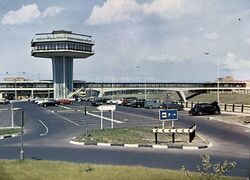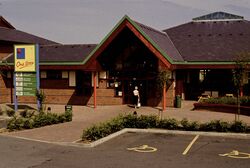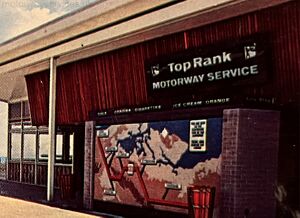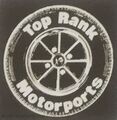Top Rank
| Locations: | up to 9 |
| Introduced: | 1963 |
| Removed: | 1992 |
| Predecessors: | Kenning Motor Group |
| Successors: | Pavilion |
Film producers The Rank Organisation went on to set up cinemas, and then branched out to build some of the early motorway service areas under the name Top Rank (later Rank Motorway Services Ltd).
Rank's first bid was a successful one for Farthing Corner, in partnership with PDS Garages of Worcester. They soon put together a team of staff dedicated to bidding for new motorway service area developments, which they trialled to call 'motorports'.
The motorway service areas were the second of Rank's motoring subsidiaries. In 1962 they had started a chain of Top Rank Motor Inns, which opened across the UK and Ireland. These developments were all treated as part of their 'leisure' portfolio
Style

Much like the film industry, Rank's motorway service areas were about being big and bold. While none of those ideas have really stood the test of time, they've certainly formed a big part of the motorway industry's history. In 1967 they dropped the phrase "service area", and insisted on using the grand title 'Motorport'.
Rank's obsession with being futuristic gave rise to elaborate architecture and facilities which offered almost no human contact at all. All of the service areas they built cost more than twice the investment suggested by the government - Farthing Corner was almost four times, leading to the government suspecting they simply wanted to buy their way into the industry. Their architects were Sydney Clough, Son & Partners and T P Bennett & Sons.
Rank's first site was opened with cheerful blue and yellow colours, but those that followed, being products of the 1970s, were inevitably finished in bland colours such as grey or beige. Usually tidy, these early service areas each had themed restaurant areas, with names like "Severn Buffet", "Cheshire Grill" and "Kentish Kiosk". Rank held the rights to 'Wimpy Express', so they often had those takeaway units, as well as Lyons ice cream vans.
In the 1980s, this changed to green, yellow and mustard, with restaurants filled with potted plants. They introduced an own-brand restaurant called Highway Inn, which was criticised for being "drab". It was joined by a fast food counter called Highway Express, which sold hamburgers for 79p (about £3 in 2025). A pot of coffee cost 79p and a cup of tea was 22p. Their restaurants were later standardised as Country In.
The dining options were soon rebranded again, with the fast food option becoming Just A Minute and the restaurant becoming Oasis. Oasis provided one Esso Tiger Token for every £3 spent in the restaurant. Critics still called it "dingy and noisy" with "limited food and high prices". The main motorway sites were now just branded 'Rank', while there was also a chain of smaller service areas branded One Stop, which was effectively a large restaurant chain. They branded their shops Supershop, and their game arcades Game Set and Match.
Rank were the first operator to introduce showers, claiming that the image of lorry drivers was changing. These facilities continued to be provided as part of a segregated diner and rest area, which was named Yorkie's Transport Diner.
Following Forte's creation of Forte Travelodge and Granada's creation of Granada Lodge, Rank wanted a piece of the budget accommodation with their own Top Rank Motor Lodge (soon shortened to 'Rank Motor Lodge'). This opened at some of their motorway and One Stop sites; the creation of One Stop may have been part of an ambition to bring Motor Lodge to more places.
Decline
Government assessment, 1966
After an initial couple of years of building bold and distinctive service areas, Top Rank quickly learned that such buildings were expensive to maintain and difficult to make a profit out of. Their rate of construction slowed down significantly. The following 20 years used almost no enterprise at all, but instead exercised extreme caution.
Their motorway service area division reported a £625,000 loss in 1966 (around £10million in 2025). The following year they blamed "substantial losses" on Britain's motorways being too short, quieter than expected, and on motorists not being interested in dining. Forton and Aust seemed to be causing the majority of the issues. Rank were now pleading with the Ministry of Transport to have their rent arrangements renegotiated, arguing that this was an emerging industry and a lot had already been learned.
Rank had wanted to introduce a news theatre, conference room and grocery shop to their service areas to attract more custom. When these were declined, they warned that the whole industry could unite to fight the government's regulations.
The division began to turn a profit in 1971, but profits weren't significant until the Prior Report of 1978. They started building new service areas again, but these were much smaller in scale. Their existing sites were all refurbished, and Motor Lodges were added.
New service areas were opened in partnership with Esso, who provided fuel at most of their sites. In 1986, Rank's parent company made an ambitious bid for Granada's parent company, which could have seen its service stations, hotels, entertainment and television facilities transferred.

In 1991, following its takeover of Mecca, the wider Rank business encountered a mountain of debt which they blamed on the economy. They were in the market to sell some of their "non-core activities", and former Mecca CEO Michael Guthrie, who had already bought some of Rank's restaurants, suggested he buy the service station division.
The sale took effect in December 1991 for £86million (around £194million in 2025), with the Rank-branded motorway sites soon rebranded Pavilion. The two One Stop sites were also sold but quickly sold on again.
Two brand new service areas were included in the deal, which Rank said had not reached their full potential. Swansea had only been open four months at the time. Building these may have been an effort to increase the value of the subsidiary.
The Rank Group continues to operate casinos today, with a similar logo.
Brand Identity
The Rank Organisation's iconic gongman logo was used throughout their motorway services. Originally, their sites were branded 'Top Rank Motorport', in black-on-white and styled like a wheel. Their logo changed from black to a very dark green in 1979.
In the 1980s, their parent company's green colour scheme became more prominent. Initially, their road signs used green-on-white, but this was later reversed to white-on-green.
-
Top Rank Motorports logo.
-
The Top Rank gongman logo, used alongside all their products.
-
The same symbol being used on a sign in the 1980s.
As of 2024, Rank's gongman logo can still be found on display at one service area: on a plaque at Cardiff West. It is also covered-up on the old-style motorway signs that advertise Cardiff West, Swansea West, and possibly also Severn View.
Locations
See also: Map of Top Rank service areas
The following services were owned by Top Rank:
- Anderton (M61)
- Aust (M4)
- Bangor (One Stop) (A55)
- Cardiff West (M4)
- Farthing Corner (M2)
- Forton (M6)
- Hilton Park (M6)
- Knutsford (M6)
- Newark (One Stop) (A1/A46)
- Scotch Corner (A1)
- Swansea West (M4)
Unbuilt Services
The following services were planned by Rank but they were never built:
- Leicester Forest East (M1)
- Taunton Deane (M5)
- Toddington (M1)
- Trowell (M1)




